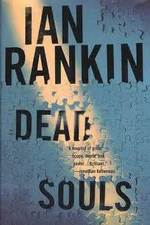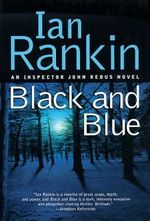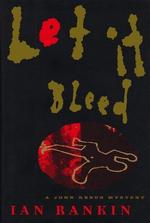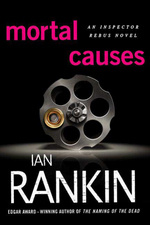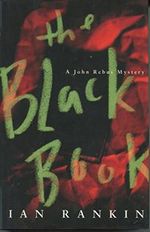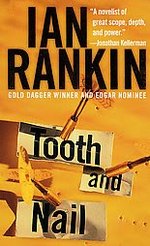by Ian Rankin
Series: John Rebus, #3Paperback, 293 pg.
St. Martin’s Paperbacks, 1996 (first published 1992)
Read: April 14 – 15, 2017

She drives home the knife.
The moment, she knows from past experience, is a very intimate one. Her hand is gripped around the knife’s
cool handle and the thrust takes the blade into the throat up to the hilt until her hand meets the throat itself. Flesh upon flesh. Jacket first, or woollen jersey, cotton shirt or T-shirt, then flesh. Now rent. The knife is writhing, like an animal sniffing. Warm blood covering hilt and hand. (The other hand covers the mouth, stifling screams.) The moment is complete. A meeting. Touching. The body is hot, gaping, warm with blood. Seething inside, as insides become outsides. Boiling. The moment is coming to an end all too soon.
And still she feels hungry. It isn’t right, isn’t usual but she does. She removes some of the clothing; in fact, removes quite a lot of it, removes more, perhaps, than is necessary. And she does what she must do, the knife squirming again. She keeps her eyes screwed tightly shut. She does not like this part. She has never liked this part, not then, not now. But especially not then.
Clearly, this is someone who needs to be stopped. And The Powers That Be have brought John Rebus from Edinburgh to London to help the hunt for the Wolfman (yeah, those who tagged the killer with that moniker may have made some assumptions). Thanks to the events in Knots & Crosses, many (who don’t know all the details) believe that Rebus is somewhat of an expert in Serial Killers. He knows he’s not, but no one asked him — he was just told to show up. It’s not long before this case gets under Rebus’ skin and he’s no longer in London to kill a couple of days as a show of support for the local police, but he’s off to catch a killer.
George Flight is the detective who’s serving as Rebus’ contact — and is leading the investigation. Rebus notes that he’s a better policeman than he is — meticulous, detailed, going through things step by step. Which isn’t doing him a lot of good at the moment, he needs something more. Enter Rebus. By and large, Flight’s the only one that wants Rebus’ help — his superior, another detective on the case, and the press liaison are pretty united in their lack of interest in bringing in someone from “Jockland” to meddle in the crimes of the big city.
As Rebus arrives in London, another body is discovered, so he shows up at the crime scene with his luggage, from there, they head to an autopsy — rushed, no doubt given the likelihood that this is another Wolfman victim. The autopsy scene — the sights, sounds and smells — is one of the best (possibly the best) that I’ve seen along these lines. It felt real, it felt disgusting, it felt sad. Between this and the opening paragraphs (quoted above), I’m again reminded that Rankin knows what he’s doing when it comes to writing. He nails this stuff.
While he’s in town, Rebus visits his ex-wife and daughter — things go poorly there, as one would expect. Things go worse when his daughter’s boyfriend comes around. When Rebus is able to connect said boyfriend to a career criminal . . .
I’m no expert on this, but I’ve read more than a few serial killer novels, it strikes me that 1992 was still pretty early in serial killer fiction-terms, and it shows. Both in Rebus’ attempts to draw the killer out, as well as Flight’s attempts to catch him. We also get to see both detectives trying to understand the serial killer — or at least how to apprehend one. Flight’s more old-school in his approach and is pretty disdainful of Rebus’ efforts to get inside the head of a serial killer. Which is not to say that this particular killer isn’t destructive, sick and really creepy.
Rebus is spurred on to this track because of who he is — but the attractive psychologist, Lisa Frazer, who wants to help him out certainly doesn’t hurt. It could be argued by some (including some characters in the book) that Rebus is far more interested in pursuing her than the Wolfman.
Rebus mostly stumbles around, indulging his infatuation with Frazer, looking for his daughter’s boyfriend, and occasionally chatting with Flight about the case. Now eventually, enough things happened that allow Rebus to put things together and figure out the identity of the Wolfman (sorta like when Wilson made a stray comment to Dr. House that got him to make the right diagnosis). Sure, it was clever, but hard to believe.
Early on, I thought this might be the book that turned me into a Rankin fan, not just some guy reading these. It came close, but I just couldn’t totally buy the ending and the way Rebus solved the case. But man, Rankin can write. I’m not totally sold on what he’s writing, but I’m really enjoying the craft. I was hooked throughout, but that ending just didn’t work.
—–


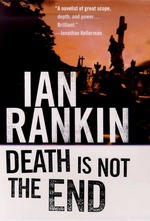 Death is Not the End
Death is Not the End




